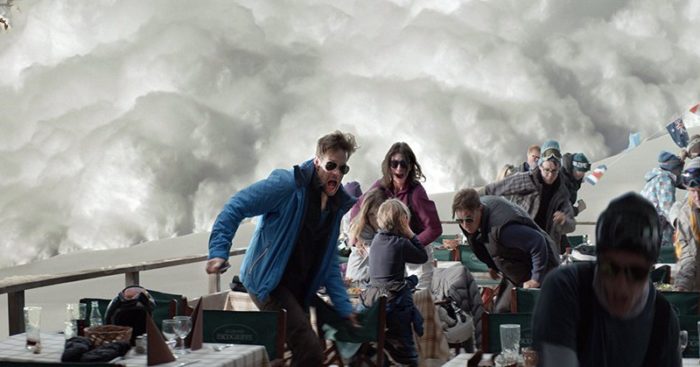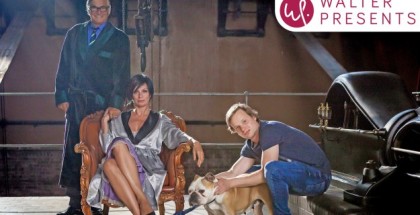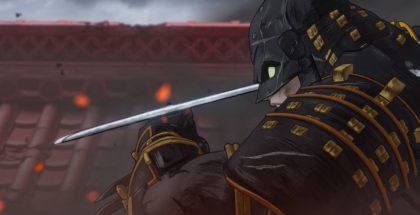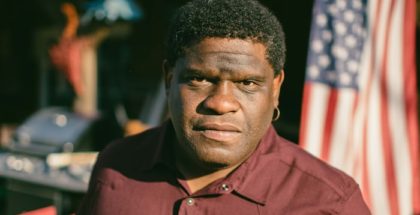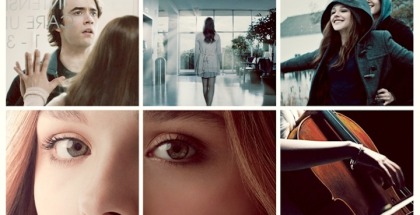VOD film review: Force Majeure
Review Overview
Alpine chill
9Moral slalom
9Aprés ski conversation
10Simon Kinnear | On 14, Apr 2015
Director: Ruben Östlund
Cast: Johannes Bah Kuhnke, Lisa Loven Kongsli, Kristofer Hivju
Certificate: 15
In his classic book on screenwriting, Story, Robert McKee explains the difference between characterisation and character by imagining a vehicular accident. Characterisation refers to the surface details of the people involved: their age, gender, background and so on. Character, by contrast, refers to the deeper essence, which can only be revealed through catastrophes such as the accident. In a story, as in life, it is these rare moments – and the choices we make when confronted by them – that matter.
Hollywood so often concentrates on one possible reaction – the hero diving in to save everybody – that perhaps the biggest shock of Ruben Östlund’s film is its reminder that McKee’s car (like an on-screen Schrodinger’s Cat) has other possible outcomes. His viciously funny, button-pushing black comedy revolves around a seemingly perfect family – Tomas (Kuhnke), Ebba (Kongsli) and kids Harry and Vera – whose ski holiday is ruptured when the husband and father reveals his character in the face of an apparent disaster.
It’s a brilliant premise for a film but one that could quickly go awry, were it not for Östlund’s dispassionate, superbly thought-out screenplay, which dares to touch every nerve exposed by the incident. Östlund ponders the implications for husband and wife alike, notably around the idea that a man whose characterisation as hero has been found wanting. A storm ensues that mixes self-denial, passive-aggressive defence and evasiveness, all of which only make the situation worse. (The source of the friction is well chosen for its metaphorical impact, because once this film starts there’s no stopping it.)
Östlund started his career making skiing movies and his familiarity with this world gives him a huge advantage. It isn’t just the glacial splendour of the place, but also the way the serenity is subverted into a kind of existential blankness. Östlund focuses on the hidden aspects of the stage-managed holiday – the lifts and escalators keeping everything flowing, the army of cleaners and ski vehicles keeping things clean. It’s an illusion of control that mirrors the routine of family life; and a canny, cruel acknowledgement that it tends to be on holiday where such routines are broken.
The power play is expertly judged, the narrative focus on peeling back the layers, each shot held in long, mostly static takes that force us to weigh up the evidence: Michael Haneke with laughs. It’s to Östlund’s credit that he gives equal weighting to both parents, with Kuhnke a selflessly pathetic figure (his crying is a thing to behold) and Kongsli as the moral force whose own sense of self is shaken as she questions her presumptions. Meanwhile, Östlund ignores the kids just enough to show how much mum and dad are too. Their self-satisfied parentage-by-tablet provides a suitably ironic glare on the central question of love and protection.
Östlund has such a smart, slippery take on his narrative that he sustains the moral ambiguity until the end, with a beautifully counterpointed double ending that leaves any hope of resolution hanging. But, just as no two snowflakes are the same, so Östlund wants the debate to continue. In a bravura move, he anticipates our post-viewing conversations in a 10-minute narrative detour featuring the couple’s friend Mats (brilliantly bearded Game Of Thrones star Hivju) and his girlfriend Fanni (Fanni Metelius). As Östlund knows, everybody – especially couples! – will have their own opinion once the film has finished, once they’re off the slopes and sat in the passenger’s seat in McKee’s car. How’s that for aprés ski?


